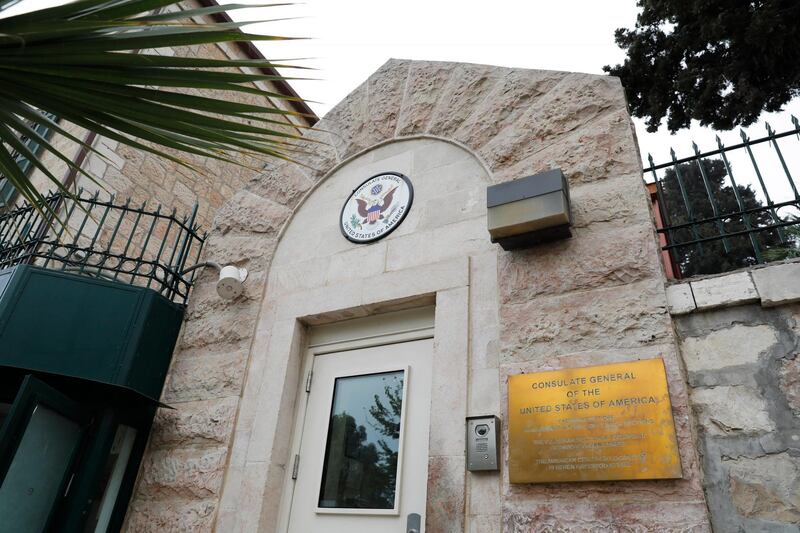Hardly a week goes by without the Trump administration taking another swipe at Palestinians. Two days ago it was announced that the US consulate in occupied East Jerusalem, a de facto American embassy to the Palestinians, will be closed.
The separate closure of the Palestine Liberation Organisation mission in Washington last month was clearly aimed at Palestinian leaders. But the shutting of the consulate is dismissive of an entire people and sends four terrible messages.
First, this will make it considerably more difficult for ordinary Palestinians to access US consular services like applying for visas. Like so much of what the Trump administration has done over the past year, it reflects a considerable hostility towards all Palestinians.
That was already fully articulated in the decision to strip Palestinian hospitals in East Jerusalem of US funding, among other gratuitous cruelties.
It effectively says that Palestinians are not a people worthy of dedicated consular relations.
To the contrary, if they want to deal with American diplomats, Palestinians can try to get to Israel to go to the US embassy in West Jerusalem, if they possibly can (but will often be unable to). And if not, the obvious corollary is that they must only have themselves to blame.
Second, this strongly consolidates the idea that, as Donald Trump keeps saying, all of Jerusalem is "off the table" in any future Israeli-Palestinian negotiations because it essentially belongs entirely to Israel, and, as he recently added, "we don't have to talk about it anymore".
Having a US consulate in occupied East Jerusalem might have been misconstrued, after all, as suggesting that there was some kind of independent Palestinian status in the city. It might even have been interpreted as suggesting that Palestinians could still aspire to base their capital in East Jerusalem.
This is an idea that Mr Trump's "Middle East peace team", led by his son-in-law Jared Kushner, has been striving to eliminate.
Closing the consulate for the Palestinians is a kind of epilogue or annex to the recognition of Jerusalem as the capital of Israel and the moving of the US embassy there from Tel Aviv. Just in case anyone still held any hopes that Washington remained open to brokering, let alone committed to, a compromise on Jerusalem, this plainly signals that it is not.
___________________________
Read more from Hussein Ibish:
[ Nikki Haley was no voice of reason ]
[ Trump has destroyed the Palestinian peace process ]
[ Palestinians should counter US assault by strengthening civic society ]
___________________________
Third, this move alarmingly consolidates the authority of David Friedman, the US ambassador to Israel, who will now also be in charge of consular services for the Palestinians.
Mr Friedman has played a key role in driving US policy in the Trump administration firmly into the arms of a "greater Israel" and settler movement, of which he is a major proponent.
Most ambassadors don't play a role in shaping policy. But Mr Friedman is the highest-ranking State Department official to take any interest in Palestinian issues and, in partnership with Mr Kushner, he has effectively dismissed Palestinians, their human rights and national interests.
As long as there was a consulate in occupied East Jerusalem dedicated to serving the Palestinian population that was independent of Mr Friedman's control, a remnant of balance in US diplomacy might have persisted. But now all US diplomacy in Israel and the occupied territories is under the direct control of this ardent backer of settlements and avowed opponent of any form of two-state outcome.
Fourth, this latest move reinforces the growing – and by now virtually inescapable – conclusion that Mr Trump, Mr Kushner, Mr Friedman and those working with them have an overriding goal, which is the destruction of any diplomatic and negotiating framework inherited from the two decades-old Oslo Accords.
With no negotiations or any progress for a long time through the Oslo process, a fresh approach was undoubtedly necessary, just as Mr Kushner argued.
But rather than building on what already existed, Mr Kushner and his team have instead been frantically destroying the structures that produced the limited gains of the Oslo framework, ones which at least kept alive the prospects for an eventual peace accord.
It's become clear that their main goal is to wreck the existing diplomatic and political architecture so thoroughly that even if their own "peace plan" goes absolutely nowhere – as now seems inevitable, thanks largely to their anti-Palestinian vendetta – no successor administration would be able to resuscitate the two-state-orientated Oslo formula.
The real target, then, is the very notion of Palestinian sovereignty and any remaining hopes for a Palestinian state.
The Trump administration's intervention has thus far been utterly destructive, aimed at wiping out Jerusalem and refugees as issues, impoverishing and humiliating ordinary Palestinians, granting Israel endless victories without asking anything in return and making US commitments that will be very difficult to reverse but which ensure that no meaningful negotiations can proceed.
There are no longer any grounds for attributing this nihilistic rampage to naivete or ignorance. It's cynically, wilfully and unforgivably destructive of any hopes for progress towards peace. And when despair over negotiations leading to increasing spates of violence, as is already emerging on the Gaza border, the authors of this policy will bear a heavy responsibility for the lives needlessly lost.
Hussein Ibish is a senior resident scholar at the Arab Gulf States Institute in Washington





